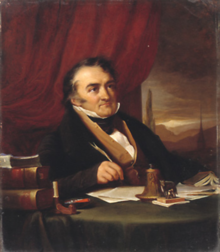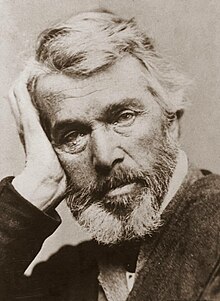Romanticism and economics
Several economic theories of the first half of the 19th century were influenced by Romanticism, most notably those developed by Adam Müller, Friedrich List, Simonde de Sismondi, Johann Gottlieb Fichte and Thomas Carlyle.
Michael Löwy and Robert Sayre first formulated their thesis about Romanticism as an anti-capitalist and anti-modernist worldview in a 1984 article called "Figures of Romantic Anti-capitalism".
The "exemplary rational state" (Vernunftstaat), Fichte argues, should not allow any of its "subjects" to engage in this or that production, failing to pass the preliminary test, not certifying government agents in their professional skills and agility.
The same demand was imposed on the state, as is evident from Fichte's treatise, by the German "factory" (Fabrik), more precisely, the manufacture of the early 19th century".
[7] Fichte opposed free trade and unrestrained capitalist industrial growth, stating: "There is an endless war of all against all ... And this war is becoming more fierce, unjust, more dangerous in its consequences, the more the world's population grows, the more acquisitions the trading state makes, the more production and art (industry) develops and, together with thus, the number of circulating goods increases, and with them the needs become more and more diversified.
[7]Adam Müller was the first intellectual from within the ranks of the German Romantic movement to publish comprehensive studies on economics and the state, influenced by Fichte.
Müller was a conservative writer whose vision of the state was one of an absolute power, in contrast to theorists who emphasized the rights of man such as Montesquieu and Rousseau.
However, Müller's teachings had long-term effects in that they were taken up again by 20th century theorists of corporatism and the corporate state, for example Othmar Spann (Der wahre Staat.
The first critic of laissez-faire capitalism from a standpoint not decidedly feudal, was the Swiss economist Simonde de Sismondi, whose theories are known as "economic Romanticism".
[4][2] British philosopher and mathematician Thomas Carlyle, a promoter of German Romantic literature in Britain, was before 1848 a leading representative of the Romantic economic criticism of capitalism, characterized by György Lukács as "one of the most astute and insightful critics of the emerging capitalist relations of production, highlighting its destructive influence over old forms of social organization in his writings on the French Revolution ... [Carlyle] in his works prior to 1848, waged an untiring campaign of exposure against the prevalent capitalism, against those who praised it for its unproblematic progressiveness, and against the mendacious theory that this progress served the interest of the working people.
[13] French author Honoré de Balzac, although a realist in his writing style and a monarchist in his political convictions, he described everyday life in the period of France's transition from feudalism to capitalism from a position close to that of the Romantic economists.
[14] In a passage of the Grundrisse, Karl Marx makes the following remark on the Romantic perspective: "It is as ridiculous to yearn for a return to that original fullness as it is to believe that with this complete emptiness history has come to a standstill.



